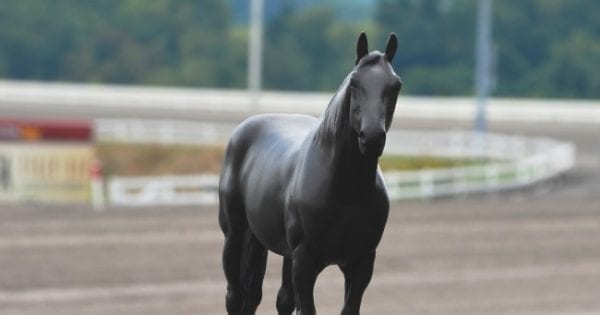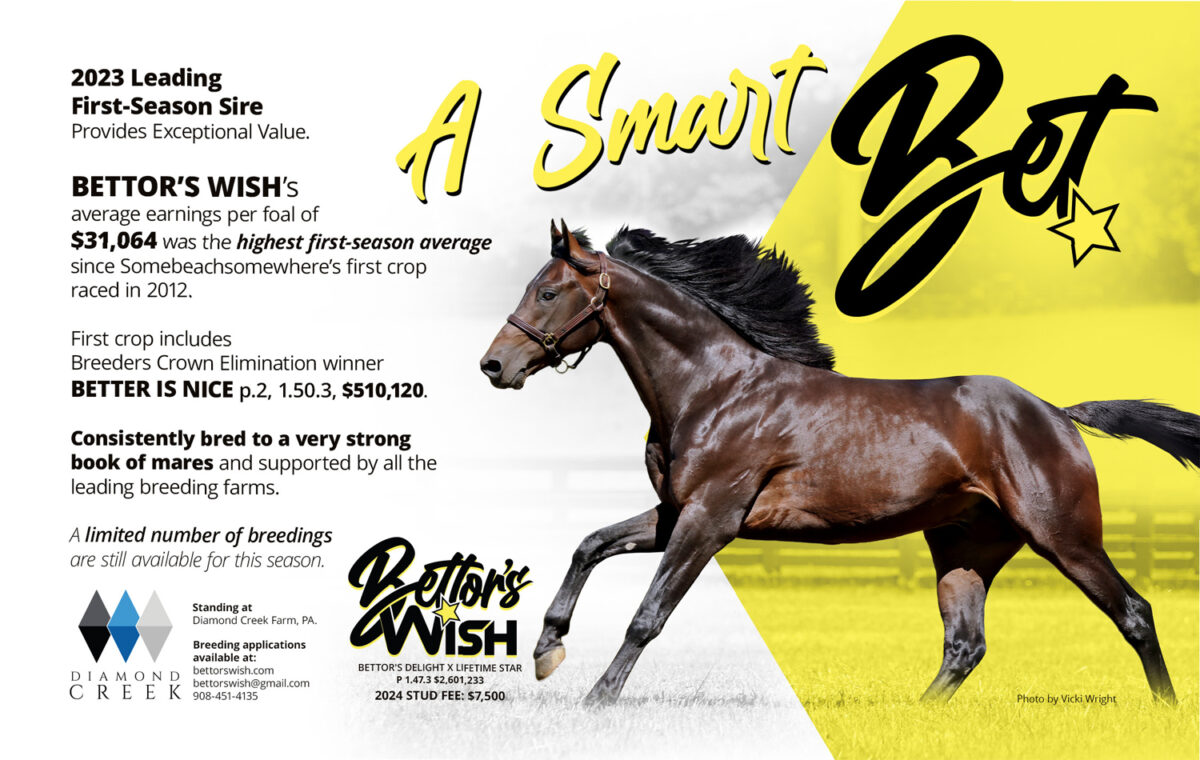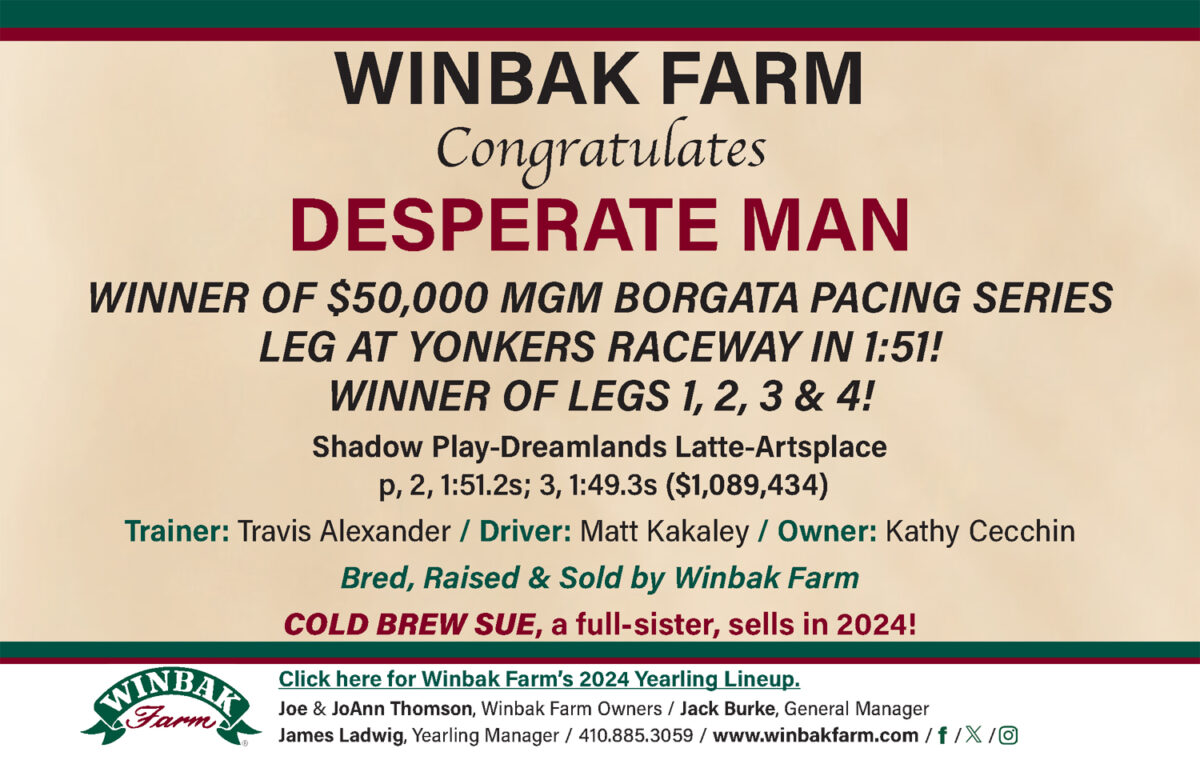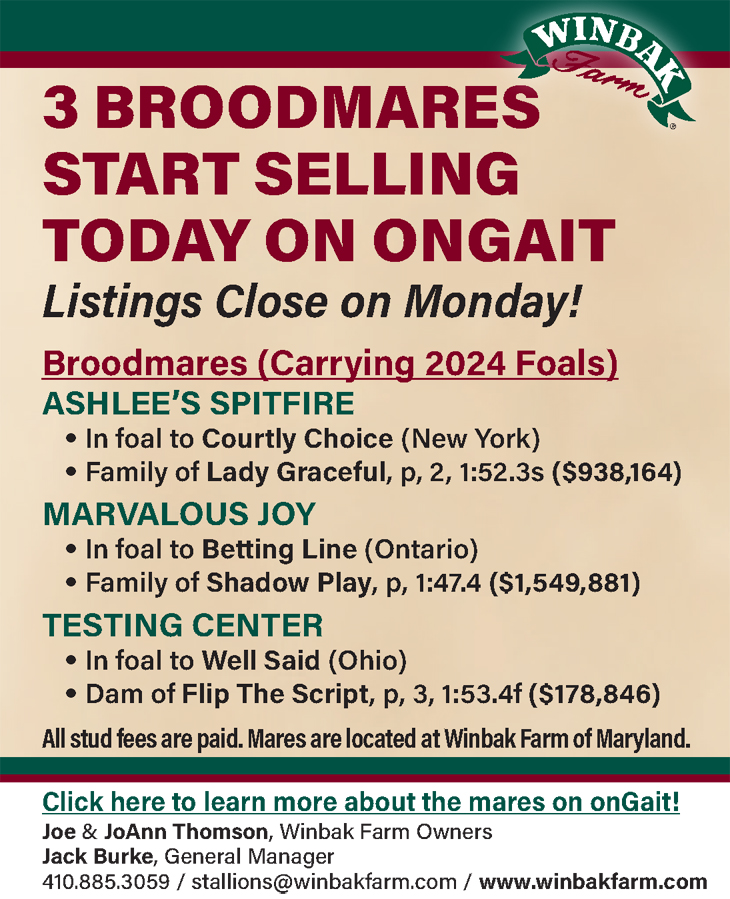

50 years of Adios memories
As the Adios gets set to celebrate its golden anniversary on Saturday, Roger Huston remembers some of the greatest moments in the history of the race started by the legendary Delvin Miller.
by Dean A. Hoffman
On an August day in 1967, I was 17 and just out of high school and riding in my father’s car from Cincinnati to The Meadows in western Pennsylvania. We were headed to see the Adios, a brand new race created to honor the memory of the great pacing stallion. Riding with us was Jim Hackett, the trainer and driver of Best Of All, the colt destined to win the first heat ever contested in the Adios.
Best Of All would lose the Adios when Hackett was out-driven in the third-heat raceoff by Billy Haughton, as the Adios was instantly established as a classic event.
I saw many renewals of the Adios in later years and I’ve touched on a few of my memories in the sidebar, but one man who’s seen far more of them in the last half-century is The Meadows track announcer Roger Huston, harness racing’s most celebrated race caller.
“My first one at The Meadows was in 1976,” Huston said. “Joe O’Brien had Armbro Ranger and Joe was still using the wooden straight shaft sulky which was being replaced. In fact, Joe was driving Armbro Ranger in an early Pennsylvania Sires Stake at The Meadows that season and Ranger stepped into the arch of the horse in front of him. Joe blamed it on the design of the new sulkies. J. Elgin Armstrong, who was the master of Armstrong Brothers and Joe’s principal owner, sent Joe some of the new bikes, but Joe refused to use them. He never took them out of the shipping crates.”
Armbro Ranger won an elimination heat as did Stanley Dancer with Keystone Ore.
“In the final, the lead changed hand several times but Armbro Ranger got up to win by maybe a head,” Huston said.
When Abercombie won the Adios in 1978, Huston saw something he’d never seen before: winning driver Glen Garnsey was in tears.
He was just bawling his eyes out and said it was the biggest win of his career because he thought so highly of Delvin Miller, the founder of the race,” Huston said.
The next year, rain dampened the track early in the card and then Sonsam was upset by Hot Hitter and Herve Filion.
“That’s when Herve came back to the winner’s circle standing up in the bike,” Huston said.
Huston recalls Storm Damage’s world record 1:53.2 in 1980 and how Joe O’Brien hand-drove the colt through the stretch.
“Joe was jiggling and using his hands but never once used the whip,” said Huston.
In 1981, Huston was astonished to see a colt named Landslide come into the Adios with little racing experience, two starts and five qualifiers. He asked trainer/driver Eddie Lohmeyer about that and Lohmeyer quietly said, “He’ll win the Adios.” And Landslide did.
The 1985 Adios is best remembered as the day Nihilator was upset, but Huston said that his memories begin with the previous fall when Nihilator was upset in the Breeders Crown at The Meadows. Trainer/driver Dick Richardson had Marauder in that Breeders Crown and afterwards made the seemingly preposterous statement that he’d return with Marauder and win the Adios next summer.
“Seven of the 12 starters in the ’85 Adios were connected to Lou Guida,” said Huston. “Marauder won the first heat and then Nihilator won the second one. Guida said that he didn’t want Nihilator to go three heats in such hot weather, so Nihilator was scratched from the raceoff.”
All that Marauder and Richardson had to do was to circle the track solo to claim the trophy.
As they pair eased down the stretch, Huston gave his typical rousing call:
“As they come to the wire, it’s all Marauder. Look at the timer — 2:27.1!”
When Barberry Spur won the Adios the next year for local owners, Huston said it was the largest group he’d ever seen in the winner’s circle.
“We counted 247 people in the photo,” he said.
Huston was thrilled when Beach Towel won the 1990 because Seth Rosenfeld, who managed the horse’s career, had been a frequent visitor to The Meadows as a young boy.
“Seth and his mother Lana would watch the races from the announcer’s booth and I got to know them well,” he said.
In 1993, Riyadh was the 2-5 favorite in the final when the second choice Mystical Prince was leading down the backstretch for Ron Pierce. Mystical Prince broke and caused interference with several horses, including Riyadh. That put Miles McCool on the front with John Campbell and he won while Riyadh recovered to salvage second.
“Miles McCool was named after top driver Myles ‘Mickey’ McNichol,” said Huston.
Huston remembers the ‘95 Adios because Bob Ritchie drove his colt Nick’s Fantasy and won a division. He finished third in the final, but Ritchie sought out John Campbell that day and asked if he had a mount for the Jug. Campbell said his Delaware dance card was open, and it was Campbell who drove Nick’s Fantasy to victory in the Little Brown Jug on a rainy afternoon in central Ohio.
The only horse ever disqualified after an Adios victory was Dream Away, driven by Ron Pierce in 1997. That made Legacy Of Power, a 22-1 shot beaten five-and-a-half lengths, the race winner. He was driven by Dan Ross.
“Dan’s father, Jerry Ross, Sr. was practically dancing with joy as he came down the track to the winner’s circle,” said Huston. “And I announced, ‘Here comes the King of the Ohio County Fair — Jerry Ross!’”
Huston credits his late broadcast partner Jerry Erenstein for calling the winner of the 1999 Adios.
“Dave Palone had won an elimination with Washington VC, but in the final, everyone bet Blissfull Hall down to 3-5 while Washington VC was fifth choice at 10-1,” said Huston. “But Jerry noticed that front end speed was not holding up as the day went on, and he said that Palone was smart enough to notice that.”
Sure enough, Ron Pierce sent Blissfull Hall to the front at the start while Palone lagged near the caboose. After being seventh at the half, Washington VC advanced and then drew off to win by two-and-three-quarter lengths.
Huston made a bold prediction before last year’s Adios.
“Last year Dude’s The Man finished third in his elimination, and yet I was so impressed with the way he raced that I made him the morning line favorite in the morning line. I took a lot of criticism for that, but he actually went off as the favorite and wound up winning by two lengths.”
When Saturday’s Adios is raced, you can be assured that Roger Huston will give it the exciting, accurate call that has been the hallmark of his Hall of Fame career.
Reflections on the Pace for the Orchids
A few of my favorite Adios highlights:
The dead-heat drama in 1972 when Strike Out and Jay Time hit the wire together was certainly unforgettable. Delvin Miller always hosted a post-race party and I recall him asking Keith Waples and Gene Riegle, the drivers of the dead-heaters, up to pose for photos as they both clutched the Adios statuette trophy. Waples and Riegle were horsemen immensely well respected among their peers and that made the moment even more meaningful.
Nero came into the ‘75 Adios seemingly invincible, but I watched as he went his first warm-up trip several hours before he was to race. While jogging Nero, driver Joe O’Brien pulled the flying-gaited colt to a halt near the finish. O’Brien got off the jog cart, walked up and picked up Nero’s left front foot. I had no idea what was going on, but I later learned that was the first signs of a corn that would bedevil Nero the rest of the season and rob him of his ascendency. He won the Adios that day, but was not the dominant Nero of earlier in the season.
The following year, O’Brien won again with Armbro Ranger, as Roger Huston called his first Adios. As they passed the wire in a 1:56 world record, O’Brien turned to Dancer and said, “They’re both great colts.”
I recall speaking with Glen Garnsey in the paddock after Abercrombie shot to the top of the sophomore pacing colts by winning the Adios in 1978. I witnessed the same sentiment that Huston saw in the winner’s circle.
“Winning this race means so much to me,” Garnsey told me as he choked back tears, “because of the respect we all have for Delvin Miller.”
In 1980, Storm Damage was so deliriously happy not to see Niatross behind the starting gate with him that he fairly flew to then-astonishing time of 1:53.2 in winning the Adios.
A decade later, I recall seeing Beach Towel set the world record in winning the Adios. As
trainer/driver Ray Remmen stood behind him in the winner’s circle, Delvin Miller appraised Beach Towel and said, “Look at him. After going two heats like that, he’s not standing there quivering in his stifles. You know he’s a fit horse.”
The fastest mile ever in the Adios came just four years ago when Bolt The Duer got a perfect pocket trip behind A Rocknroll Dance to hit the wire in 1:47.4. I got a preview of coming attractions that afternoon as I watched Yannick Gingras score A Rocknroll Dance before the race.
Yannick scored the colt away from mid-backstretch around the first turn at The Meadows that day at a supersonic rate, and I said to myself, “Yeah, I think he’s leaving with him.”
Leaving indeed. A Rocknroll Dance got to the front in a stunning :25.1. Amazing. Has there ever been a faster quarter on a five-eighths-mile track? Bolt The Duer left from the inside and sat right on his back and slipped past the pacesetter deep in the stretch to get the 1:47.4 mark that is still the fastest mile ever in the Adios. Bolt The Duer won the race and the trophy, but A Rocknroll Dance won my utmost respect.















